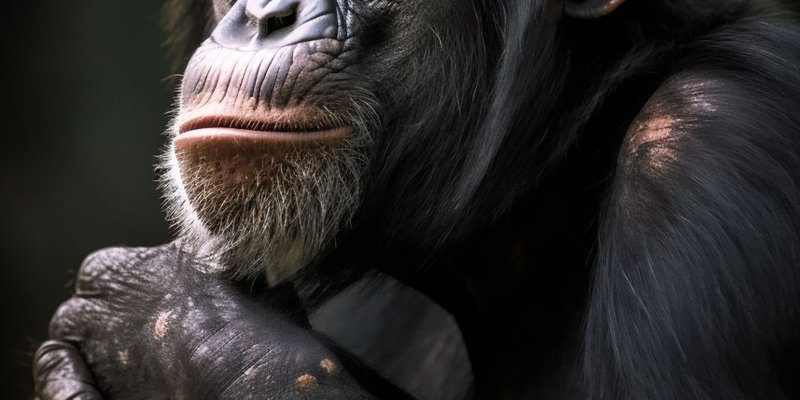
So, what exactly makes a chimpanzee so clever? Well, let’s dive into their cognitive abilities and behaviors to see how they stack up against not just humans, but other animals as well. You might be wondering about their problem-solving skills and how they compare to our own. Buckle up as we explore the remarkable world of chimpanzee intelligence!
Understanding Chimpanzee Intelligence
Chimpanzees exhibit a wide range of cognitive abilities that can rival those of young human children. One way to think about it is to imagine a child learning to navigate the world—chimpanzees do the same, but in their unique way. They can learn from experience, adapt their behaviors, and even teach one another. This ability to learn and adapt is a hallmark of intelligence.
Research shows that chimpanzees can recognize themselves in mirrors, a skill that indicates self-awareness. This ability is not just about seeing their reflection; it’s about understanding that the image they see represents themselves. Think about how profound that is—being aware of one’s own existence! This self-recognition sets the stage for other complex behaviors, like planning for the future or making strategic decisions.
Moreover, chimps have demonstrated advanced problem-solving skills. In various studies, they’ve been given tasks that require them to use tools, like sticks to extract termites from a mound. They learn quickly: if a stick works one day, they’ll remember to use it again. You might find it fascinating that they can even innovate new techniques when faced with different challenges.
Tool Use and Innovation
One of the standout features of chimpanzee intelligence is their ability to use tools. Tool use isn’t unique to humans, but chimps have shown impressive skills that hint at their cognitive depth. They’ve been observed using sticks, stones, and leaves to achieve different tasks. For example, they might use a stick to fish for termites or a rock to crack open nuts.
This tool use isn’t just about picking up an object and getting the job done. Chimpanzees show planning and foresight in selecting the right tool for a specific purpose. Imagine a chimp pondering which stick is long enough to reach that tasty treat but not too cumbersome to carry around. It’s all about strategy, and this showcases their ability to think ahead.
Another layer to this behavior is the social aspect. Chimps often learn these skills from each other, which means they can pass on knowledge like a skillful craftsman in a workshop. This transmission of knowledge helps set them apart and shows that their intelligence involves not just individual capabilities but also community learning.
Social Learning and Communication
Speaking of community, chimpanzees are incredibly social creatures. They live in groups called troops and communicate through a range of vocalizations, gestures, and facial expressions. It’s like being part of a big family where everyone has their way of saying “hello” or “I need help.” This social behavior reveals a different angle to their intelligence.
Chimpanzees can recognize individuals within their group, remembering complex relationships and social hierarchies. They use various calls to warn of danger, signal food sources, or even show emotions like excitement or distress. This complex communication is a vital part of their intelligence, allowing them to navigate social interactions with finesse.
You might find it surprising that they can also understand the intentions of others. In some studies, chimps are able to figure out when another chimp is trying to deceive them. This kind of social cognition showcases their understanding that others have thoughts and intentions that might differ from their own. It’s a clear sign of advanced intelligence, similar to what we see in young children.
Emotional Intelligence and Empathy
It’s not just raw smarts that make chimpanzees fascinating; their emotional intelligence is equally impressive. Chimpanzees can show a wide range of feelings, such as joy, sadness, and even grief. For instance, when a troop member passes away, others may display signs of mourning—like staying close to the body or exhibiting withdrawn behavior. It’s heart-wrenching to see, but it demonstrates a depth of compassion and emotional awareness.
Empathy is another aspect where chimps excel. They’ve been observed comforting one another in times of distress, which hints at their ability to recognize and respond to the emotional states of others. Imagine a friend stepping in to offer support when you’re feeling down; that’s similar to what chimps do within their communities.
This emotional connection is vital for their social structure. It helps maintain bonds within the troop, promotes cooperation, and encourages a supportive environment. Emotional intelligence, combined with cognitive abilities, creates a well-rounded picture of chimpanzees as not just intelligent beings but also deeply feeling individuals.
Chimpanzee Behavior and Learning
Now, let’s take a closer look at how chimpanzees learn and behave in their natural environments. They are curious creatures, always exploring and experimenting with their surroundings. This curiosity drives them to try new things, whether it’s finding a new food source or engaging in play with other members of their troop.
Play behavior in chimpanzees is essential for their learning. Young chimps engage in rough-and-tumble play, which helps them develop social skills and physical abilities. You might liken it to how kids play games to learn cooperation and teamwork. Through play, they discover limits, develop agility, and even practice the social hierarchies that exist in their adult lives.
Moreover, chimpanzees are highly observant. They watch each other closely, learning through imitation. If one chimp discovers a new way to crack open a nut, others may follow suit. This observational learning is crucial for their survival, as it allows them to pick up skills that they might not have discovered on their own.
The Conservation of Chimpanzees
Understanding chimpanzee intelligence and behavior is vital not just for our knowledge but also for their conservation. Sadly, chimpanzees face numerous threats, including habitat loss due to deforestation and hunting. As we learn more about their cognitive abilities, we can better appreciate their value in the ecosystem and the importance of protecting their environments.
Conservation efforts often highlight the need to preserve their natural habitats while also promoting education about their behavior and intelligence. By fostering a sense of connection to these remarkable beings, we can inspire action to ensure their survival. After all, protecting chimpanzees means safeguarding a piece of our own evolutionary history.
Moreover, programs that support rehabilitation and reintroduction of captive chimps back into the wild can be enhanced by understanding their social structures and cognitive needs. It’s not just about saving them; it’s about helping them thrive in a way that respects their intelligence and emotional depth.
Final Thoughts
In conclusion, chimpanzees are not just fascinating creatures; they are remarkably intelligent beings with emotional depth and social structures that mirror our own in many ways. Their cognitive abilities—like problem-solving, tool use, and communication—remind us of our connection to the animal kingdom.
Understanding how smart chimpanzees are helps bridge a gap between species, encouraging us to appreciate and protect them. As we look deeper into their world, we not only learn about them but also reflect on what it means to be intelligent and emotional beings ourselves. So the next time you think of intelligence, remember the remarkable chimpanzee—an animal that truly embodies what it means to be smart.

